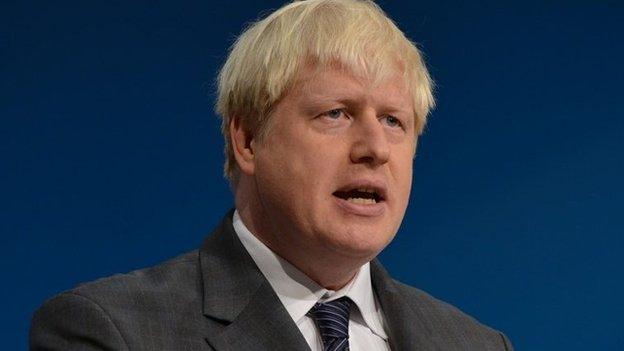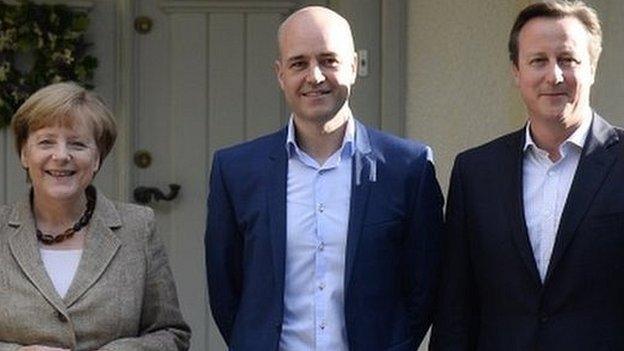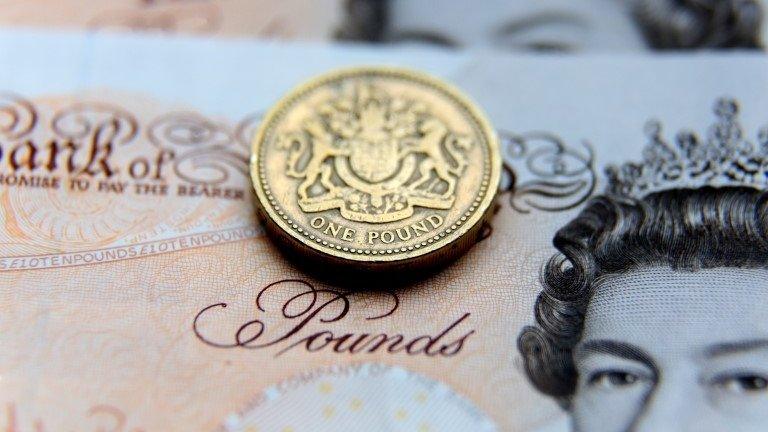Don't fear European Union exit, says Boris Johnson
- Published

The UK should not be "afraid of in going for an alternative future" if plans to reform the country's relations with the European Union fail, London Mayor Boris Johnson has said.
Prime Minister David Cameron has promised an in-out referendum on membership in 2017, following a renegotiation of ties with Brussels.
Mr Johnson said the UK could be boosted by a looser association.
It follows a report from his adviser saying a UK exit could be "viable".
The document, by economist Gerard Lyons, suggests a less formal relationship with the EU could improve trade with the rest of the world by 1.1% by cutting bureaucracy and restrictions on commerce.
'Turbo-charged'
Mr Cameron has promised to hold a referendum on Britain's membership of the EU in 2017 if he wins next year's general election. His plan is to persuade Britain's EU partners to allow it to bring powers back from Brussels before the referendum happens.
In his address at Bloomberg in east London, Conservative Mr Johnson praised the EU as a "force for stability and economic integration" since World War Two.
But he warned it was now suffering from a "crisis of economic under-performance, and a related collapse of political trust".
He blamed high rates of youth unemployment on efforts to stabilise the single currency, calling the euro "an engine of mass job-destruction".
Mr Johnson added: "There is little doubt that it is that extra stuff, the stuff from Brussels, that is helping to fur the arteries to the point of sclerosis.
"We still have an expansionist Commission culture, in that they do too much of the things they ought not to do and not enough of the things they ought to do."
'Generous exit'
On Mr Cameron's promised renegotiation, Mr Johnson said: "If we succeed in getting these reforms we should put the amendments to the British people for an in-out referendum, and if we get the reforms then I would frankly be happy to campaign for a yes.
"And as Gerry Lyons argues in his paper that would be the single best option for Britain and London, with London's economy almost doubling in size over the next 20 years to £640bn."
But he argued that "if we can't get that reform, then the second option (of leaving the EU) is also attractive".
He suggested the UK could negotiate a "generous exit", giving access the European common market without the current political ties, saying: "And that combination of a lower regulatory burden and undiminished trade access would cause exports to boom, and the whole thing would be turbo-charged by new trading agreements with major partners such as China, Brazil, Russia, Australia and India.
"With less red tape for business, and a more competitive tax environment, it has been persuasively argued that British GDP would grow by 1.1%."
Mr Johnson said his preferred option was to stay in a reformed EU, adding: "I think we can get there; but if we can't, then we have nothing to be afraid of in going for an alternative future, a Britain open not just to the rest of Europe but to the world, where we have historic ties and markets with vast potential for all the goods and services that originate in London - and will continue to do so under any circumstances."
UKIP accused the London mayor of "selling a myth to the British people" in yet another speech on Europe.
The party's deputy chairman Suzanne Evans: "Boris, rather than come out and be his own man, has been wrangled by Tory bigwigs to dance to Cameron's tune.
"How hollow and disingenuous to spend half an hour criticising Brussels, employing all the wit and wisdom possible, to conclude that campaigning to stay in is actually the best option."
- Published28 June 2014

- Published29 June 2014
